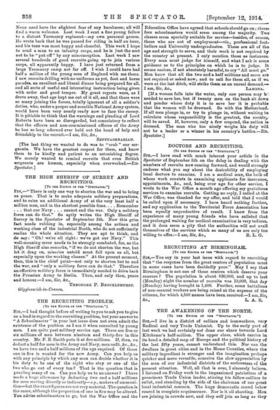THE RECRUITING PROBLEM.
To TER EDITOR Or THE "SPECTATOR."1 SIR,—I had thought before of writing to you to ask you to give us a lead in regard to the recruiting problem, but your answer to "A Schoolmaster " in your last issue does not even admit the existence of the problem as I see it when consulted by young men. I am quite past military service age. There are five or six millions of men between nineteen and thirty-five in this country. Mr. F. E. Smith puts it at five millions. If, then, we deduct a half for men in the Army and Navy, men unfit, &c., &c., we have two and a half millions of the age required. Of these one in five is wanted for the new Army. Can you help us with any principle by which any man can decide whether it is his duty to be one of the eight who stay or one of the two who go out of every ten ? That is the question that is puzzling many of us. Can you help us to an answer ? I have made a huge allowance by deducting two and a half millions for men serving directly or indirectly—e.g., makers of ammuni- tion—but the exact figures are not very material. The question is the same, although the proportion of one in five may be altered. You advise schoolmasters to go, but the War Office and the Education Office have agreed that schools should go on; there- fore schoolmasters would seem among the majority. Two classes seem specially suitable for service—besides, of course, those who are out of employment—viz., professional foot- ballers and University undergraduates. These are all of the age and strength to serve, and their work is not required by the country at present. I only mention these as instances. Every man must judge for himself, and what I ask is some guidance as to the principles on which he is to judge. It seems useless, if not absolutely harmful, to cry "All must go." Men know that all the two and a half millions and more are not required or asked now; and to call for them all, as if wo were at the last ditch, will strike them as an unreal demand.---* [If a woman falls into the water, only one person may b- needed to save her, but if twenty men on the bank sit down and ponder whose duty it is to save her it is probable that the woman will be drowned. So with the Motherland. If all men plunge in, or try to plunge in, without waiting to calculate whose responsibility is the greatest, the country will be saved. If, however, only a few respond, the nation is doomed. The man who too nicely weighs his duty will not be a leader or a winner in his country's battles.—ED. Spectator.]


































 Previous page
Previous page